|
|
|
Sort Order |
|
|
|
Items / Page
|
|
|
|
|
|
|
| Srl | Item |
| 1 |
ID:
146986
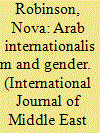

|
|
|
|
|
| Summary/Abstract |
Historians of the Middle East have used gender to explore a range of topics, from how crises around gendered practices have contributed to the construction of national identities to women's roles in nationalist movements. Whereas early gender histories focused on single nation-states, recent scholarship has turned to regional and transnational connections. Yet the international sphere, the domain of nation-states and nongovernmental organizations in relation to each other, has yet to be examined through the lens of gender. In this essay, I argue that doing so yields new insights into the relationship between the national and the international in the Middle East, and into the process of rights claiming in postcolonial nation-states. I make this argument through a discussion of the third session of the United Nations Commission on the Status of Women (UNCSW).
|
|
|
|
|
|
|
|
|
|
|
|
|
|
|
|
| 2 |
ID:
146976


|
|
|
|
|
| Summary/Abstract |
This article expands our understanding of state–society interactions in rural Algeria under French colonial rule, focusing specifically on villages in the eastern department of Constantine. I analyze previously unstudied administrative records, newspapers, petitions, and complaints to show how sanitary regulations and medical expertise came to shape relationships among villagers, local elites, and the colonial state from the early 20th century. Villagers responded to state-led medicalization by seeking the protection of medical doctors, not only from disease but also from the state itself. In particular, they sought to avoid heavy-handed treatment by qaʾids and local elites who applied disease control measures without appropriate medical knowledge. Furthermore, close examination of petitions sent during World War I suggests that hardships experienced by rural communities during the war accentuated nascent feelings of entitlement across demographic, ethnic, and religious communal boundaries toward state medical treatment.
|
|
|
|
|
|
|
|
|
|
|
|
|
|
|
|
| 3 |
ID:
146980


|
|
|
|
|
| Summary/Abstract |
This article explores the “fundamentalist dilemma,” or how fundamentalist movements participate in secular political systems, especially when they gain prominent political positions that allow them to impose their extreme ideology on the entire society. After analyzing prevailing responses to this dilemma, ranging from political integration to aggressive takeover, the article turns to the case of Israeli Haredim. It explores three models of political integration through which Haredim have applied religious practices in the public sphere: protest, consolidation, and takeover. The study's main finding is that, opposite to a commonly accepted assumption that fundamentalists’ integration into secular politics causes them to moderate, the more political power that fundamentalists accrue the stronger is their tendency to promote their religious agenda. Yet the Israeli Haredi case also reveals the limitations of this tendency: fundamentalists often restrain their expansionist instinct when having to take nonfundamentalist reactions into consideration.
|
|
|
|
|
|
|
|
|
|
|
|
|
|
|
|
| 4 |
ID:
146981


|
|
|
|
|
| Summary/Abstract |
In 2010, reflecting on her landmark 1986 article “Gender: A Useful Category of Historical Analysis,” Joan Scott wondered whether, since the original article's publication, the category of gender had “lost its critical edge.” She noted how it had often come to refer simply to the roles assigned to “women” and “men,” while those categories themselves were assumed to be determined by biological “sex” and thus stable and self-explanatory. In other words, the gender/sex binary persisted “despite a generation of scholarship aimed at deconstructing that opposition.” Scott proposed that gender as an analytical category continues to be useful today only if it is “taken as an invitation to think critically about how the meanings of sexed bodies are produced in relation to one another, how these meanings are deployed and changed.”
|
|
|
|
|
|
|
|
|
|
|
|
|
|
|
|
| 5 |
ID:
146987


|
|
|
|
|
| Summary/Abstract |
Gender history has a history proper to itself. This is not only to say that the study of gender as a scholarly and institutional practice is bounded by space and time, and that it has an archive of its own, but also that “gender history” as a relatively recent disciplinary innovation is properly gender history to the extent that it exists in relation to and distinct from other histories of becoming man, woman, trans, and so forth. In other words, gender history, regarded as a discursive formation in its own right, constitutes its object in ways that overlap but remain distinct from other conceptions of being and becoming gendered that are spatially and temporally diverse. Seen in this light, it can be said to map onto a history of sovereignty that has privileged particular forms of life and that acts as a limit on gender's analytical and critical value.
|
|
|
|
|
|
|
|
|
|
|
|
|
|
|
|
| 6 |
ID:
146982
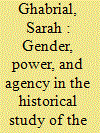

|
|
|
|
|
| Summary/Abstract |
It is fair to say that some of the most vibrant work—and most challenging questions—surrounding “agency” and its intelligibility have come out of feminist scholarship on the “Muslim world,” broadly defined. This piece considers the transdisciplinary lives of agency as analytic tool, its uses and limitations, its particular proximity to gender-critical research, and, in turn, seeming synonymization with women.
|
|
|
|
|
|
|
|
|
|
|
|
|
|
|
|
| 7 |
ID:
146984
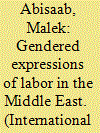

|
|
|
|
|
| Summary/Abstract |
A dearth of information is available on workingwomen in the Middle East during the 19th and first half of the 20th century. This gap is compounded by the male biases of the official reporters, journalists, unionists, labor activists, and scholars who produced the information that does exist. Nevertheless, it is possible to write a gendered history of labor on the basis of less-than-ideal sources, which can be enriched by the use of oral history, popular literature, autobiographies, and even fieldwork focused on women's and men's family relations and work patterns.
|
|
|
|
|
|
|
|
|
|
|
|
|
|
|
|
| 8 |
ID:
146985
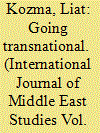

|
|
|
|
|
| Summary/Abstract |
Middle East gender studies is a lively and fascinating field. With two very different journals (Hawwa and Journal of Middle East Women Studies) and dozens of panels at the Middle East Studies Association Annual Conference and the World Congress for Middle Eastern Studies, we have come a long way over the last two decades. Women's, queer, and masculinity studies are now part of how we understand gender studies in the region. Middle East gender studies does, however, remain marginal in two fields—Middle East studies and gender studies. It is normally assigned to the end of a Middle East studies conference (“and gender”), or, conversely, to the end of a gender studies conference or edited volume (“and elsewhere”). But can a discussion of technology or World War I in the modern Middle East weave in insights gained from gender or queer studies? And can a discussion of women's movements or women's labor incorporate what we know about the Middle East? I believe that more can be done to mainstream gender in Middle East studies, and to mainstream the Middle East in gender studies. Transnational history is a particularly promising direction for this endeavor.
|
|
|
|
|
|
|
|
|
|
|
|
|
|
|
|
| 9 |
ID:
146983
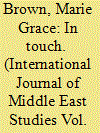

|
|
|
|
|
| Summary/Abstract |
When introducing the body as an interpretive framework, it has become almost cliché to cite poet and essayist Adrienne Rich's instruction that we “begin … with the geography closest in.” For well over a decade, scholars have addressed the body and its attendant intimacies as microsites for examining broad sociopolitical systems of race, gender, class, sex, empire, and nation. This focus on the body contributes to the ongoing feminist work of overturning the analytic dichotomy of public and private and has launched a much newer project of approaching our physical selves as historical subjects in their own right.
|
|
|
|
|
|
|
|
|
|
|
|
|
|
|
|
| 10 |
ID:
146979
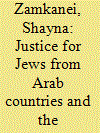

|
|
|
|
|
| Summary/Abstract |
Since its founding in 2002, the group Justice for Jews from Arab Countries (JJAC) has appealed to governments, international organizations, and Jewish communities worldwide to recognize post-1948 Jewish emigrants from Arab countries as refugees. Yet prominent scholars, Israeli government officials, and Jewish political activists in Israel and the United States have traditionally opposed this designation. Why, then, have JJAC's efforts met with success? This article draws on the experiences of JJAC and its predecessor, the World Organization of Jews from Arab Countries, as well as the claims of their critics, to argue that JJAC's accomplishments are due to the organization's ability to extricate the term “refugee” from a Zionist discursive context and to apply it within the framework of international law and human rights.
|
|
|
|
|
|
|
|
|
|
|
|
|
|
|
|
| 11 |
ID:
146977
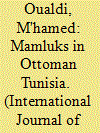

|
|
|
|
|
| Summary/Abstract |
This essay examines how administrative documents categorized the mamluks who served Ottoman governors of Tunis from the early 18th to the mid-19th century. The categorization of these state slaves-cum-servants illuminates three issues, namely, the relationships between Islamic states and societies, interactions between the Ottoman Empire and its provinces, and forms of military slavery around the globe. Seeing registers, letters, and historical chronicles as spaces of interaction allows us to break free from an a priori definition of mamluks. By exploring how slaves and servants contributed to defining themselves in administrative documents, I not only argue for a new understanding of the mamluk category, but also show that mamluks did not separate state and society. On the contrary, in the Tunisian case, mamluks connected the state to various imperial and provincial social forces.
|
|
|
|
|
|
|
|
|
|
|
|
|
|
|
|
| 12 |
ID:
146978
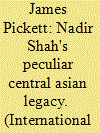

|
|
|
|
|
| Summary/Abstract |
Over the course of the 18th–early 20th centuries, a curious narrative emerged in Central Asia wherein the Turko-Persian monarch Nadir Shah Afshar was converted from Shiʿism to Sunnism by a group of Islamic scholars outside of Bukhara. While this legend was rooted in Nadir Shah's theological ambitions to bring Shiʿism back into the Sunni fold as a fifth school of canonical law, the memory of that event in the subsequent two centuries was intimately tied to the establishment of several scholarly dynasties, which managed to perpetuate themselves all the way to the Bolshevik Revolution in 1917. This article engages the memory of this mythological conversion to explore sharpening conceptions of sectarian divisions and the role of genealogy in projecting spiritual authority. Most broadly, it argues that—far from a passing depredation—the Afsharid Empire profoundly shaped the geopolitical and social landscape of Persianate Asia.
|
|
|
|
|
|
|
|
|
|
|
|
|
|
|
|
|
|
|
|
|